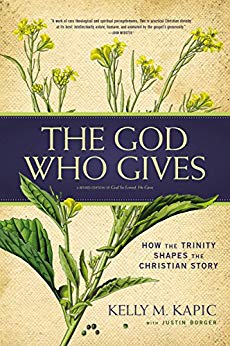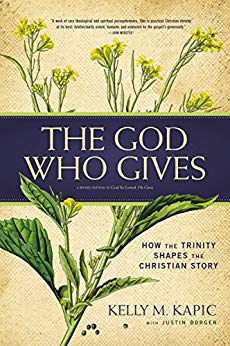The God Who Gives: How the Trinity Shapes the Christian Story

A Denver Seminary Book Review by Denver Seminary Professor of Training and Mentoring Debra Anderson

Kelly M. Kapic, with Justin Borger. The God Who Gives: How the Trinity Shapes the Christian Story. Grand Rapids: Zondervan, 2018. $22.99. Paperback, 289 pp. ISBN 9780310520269.
The God Who Gives is a revision of Kelly Kapic’s original 2010 work, God So Loved, He Gave. It is a theologically integrated work, pulling from voices across the aisle and accomplishing a tone as generous as the God he describes. In this work about God’s generosity, Kapic’s rich reform traditions don’t hinder him from sharing in the scholarship of all, gracing the reader with a wealth of footnotes that read as a brief history of Christian thought and practice. He carries a torch for nothing but clear interpretation. Kapic is a learner as much as he is a professor.
The rich, yet accessible, doctrinal discussions answer questions and define terms with fresh insights. Kapic is a tour guide of attentiveness, pointing out what else can and should be explored as the reader journeys more deeply into the breadth and depth of God’s generosity. Through the biblical narrative of creation, fall, redemption and restoration, Kapic paints the story with persistence and paradox.
From the start, rather than as a mildly interested, controlling Creator, Kapic establishes the sovereignty of God as a truism of his eternally benevolent ownership and care-taking of all creation. There is no sense that, “God is sovereign, therefore I must suffer,” but rather, Kapic asserts that the glory of redemption is that as God creates, “He invites us to enjoy the feast and to extend his gracious hospitality and care to others; in this way we are images of our Creator (26).” As much as God gives, he establishes our own ability to give and to do good work in a world which God desires to receive back renewed.
This good work is defined and demonstrated at the end of the volume with a focus on hospitality as a primary virtue. Hospitality heals both host and guest, allowing each to “release what we have received in the world” (239) and Kapic establishes it as the essential practice of generosity. Hereto the reader finds examples of his practical, accessible style, offering potential barriers to our generous response and definitions for good works, “nothing other than outward and concrete expressions of love” (214).
What God creates, God fills. This summary statement is, perhaps, the most effective imagery of the book. Weaving from the retelling of Genesis in chapter one to the need for a king in chapter three, to the filling of the Holy Spirit in chapter 8, Kapic demonstrates how, again and again, “God creates an empty space and then he fills it” (26). Indeed the vocation of humankind involves “1) filling and 2) ruling all things” (59) thereby giving God glory as his image and likeness. Kapic shows how God is always generous to fill whether that be the earth, the tabernacle, the hearts of humankind or the eternal city. This thread throughout the book evokes hope and inspires courageous flourishing.
Thematically speaking, Kapic is true to his goal. The generosity of God isn’t lost after a few chapters, but deepened and widened, filling all the reader’s cognitive cracks along the way in just the way that God is inclined to do. Kapic is skillfully able to demonstrate the generosity of God with his writing constructs and chapter subjects thus, stitching together the generous work of God in mutuality with the believer from beginning to end.
What is the tension in reading this book? If the book left an unanswered question it was the how the Trinity acts, something expected to be more central to the writing due to the subtitle. There is a heavy focus on the Father and Son, and yet the Holy Spirit is conventionally minimized. While the treatment of all is unmistakably true and good, I was hoping for more equalized discussion on both the gift and the gifts of the Spirit in humanity’s ongoing transformation. To be conformed more and more to God’s image is a worthy work we do with God. Yet, this is something that occupies just a small space in the book. Indeed, the main idea doesn’t arrive until page 132, “The divine movement of God’s generosity is Trinitarian; it proceeds from the Father, through the Son, and it is completed by the work of the Spirit”– the Spirit which only receives 30 pages of attention. Again, it’s a thoughtful treatment, but the subtitle offered a hope that there would be more.
A secondary tension didn’t find resolve until I relented as a reader to subscribe to a communal outworking of the thesis. Kapic’s work isn’t for me, but for us. God’s generosity is shown to all and the book ends with a sending (as opposed – refreshingly – to a calling) into communal stewardship. This stewardship begins with self-abandonment to God’s authoritative keeping and persists via our belonging to him not just as individuals but as a people. Kapic’s thoughts on the church complete the theme as those who give and receive together, not for one’s self, but for the flourishing of the world.
Debra Anderson, MA
Training and Mentoring Faculty
Denver Seminary
July 2018
